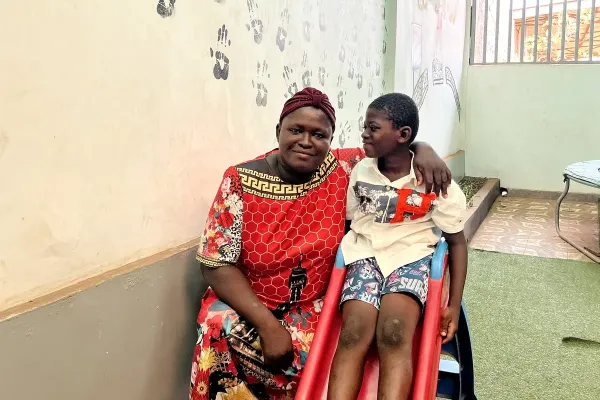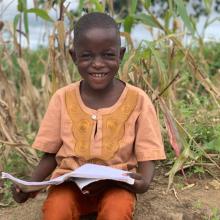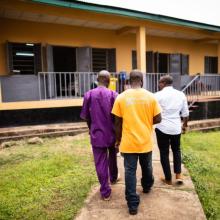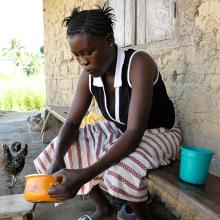Kabia, a dedicated nurse in the Child and Adolescent Mental Health (CAMH) unit at the Sierra Leone Psychiatric Teaching Hospital (SLPTH), visits 10 patients in their homes in one day, providing care while tackling transportation challenges. High costs and inaccessible roads often prevent patients from receiving adequate care.
She vividly remembers her first home visit which was a big lesson for her: “I was climbing up a very steep hill to see a patient. As the neighbors were helping me to find my way to the patient’s home, I skated across the dirt road and fell down. I felt so miserable because the hills and roads are so bad, and sometimes people live very far away and can’t afford to travel to the hospital for care.”
That first visit, climbing the hill, humbled her and gave her insight into challenges that patients experience each time they leave their home to get treatment. Kabia is one of the dedicated nurses assigned to the CAMH unit, that conducts essential home visits to ensure patients facing barriers to accessing care receive the support they need.
Partners In Health (PIH) Sierra Leone’s home visit program began in 2022, a year after the CAMH unit officially opened. The unit has been shaped by the leadership of Dr. Elizabeth Allieu, psychiatry resident and pediatric specialist at the SLPTH. She recognized the glaring gap in mental health care for children and adolescents within the country and spearheaded the creation of Sierra Leone’s first child and adolescent mental health unit. Supported by PIH Sierra Leone and other partners, the unit aims to create a space for young people to manage their mental health with confidence.
Growth in patients and services
Over the past three years, the number of patients seen in the CAMH unit has grown significantly, from 76 in the first year to over 400 in the last two years. The dedicated team continues to raise awareness around child and adolescent mental health to reach even more patients.
“Not many people realize that children and adolescents also live with mental health conditions,” says Allieu. “People hear about the unit and ask: do children even have mental illnesses?”
The CAMH unit supports children as young as four months up to 18 years old. Many children and adolescents treated in the unit are diagnosed with epilepsy, developmental disorders or learning disabilities, autism, attention-deficit hyperactivity disorder (ADHD), and cerebral palsy. Treatment plans vary by patient and usually involve a mix of psychoeducation, psychotherapy, and medication. All services are free, due to support from PIH in partnership with the Sierra Leone’s Ministry of Health.
Sia Davies, a mental health nurse who works in the unit, shares her excitement about how the unit has evolved.
“I am happy that the unit is growing. It is really encouraging,” Davies says. “People travel from various districts across Sierra Leone and even come from Guinea. In another three years, I am anticipating that the number of patients will have doubled or even tripled.”
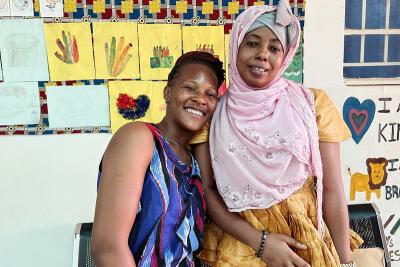
Sia Davies, left, is a mental health nurse, and Kumba Marrah is a clinical nurse at the Child and Adolescent Mental Health (CAMH) unit at the Sierra Leone Psychiatric Teaching Hospital (SLPTH).
Photo by Sabrina Charles / PIH
Every week, there is one day dedicated to new patient visits at the hospital. During the rest of the week, staff conduct school outreach and follow up with existing patients through home visits, presenting skills training sessions for children, and support sessions for parents.
The school outreach program was the unit’s first-ever initiative. Every Monday, social workers travel to schools to educate principals and teachers about common signs of mental health conditions that may affect children’s development and require additional support. Over 80 schools have been supported so far.
“The school visits are one of the biggest platforms to disseminate messaging around mental health and get the community aware and engaged,” says Mohamed Idrissa, a social worker who leads the school outreach program.
The program also acts as a referral pathway to link students to specialized care. When children are identified with potential development delays, the school links them to the CAMH unit, where they receive support from trained mental health professionals.
Support for children and their parents
On Fridays, the CAMH unit offers group sessions for parents and skills training for children facing educational barriers. Through tailored activities and exercises such as writing, yoga, and shape recognition games, the children are empowered to develop essential skills, continue learning, and unlock their potential.
While the children have an opportunity to play, the parents come together for group therapy. This is a space that the unit created to allow parents who share similar experiences, in which mental health illnesses are stigmatized, to support one another. The parents share their personal perspective about supporting their children, what mechanisms work best, and how they can improve.
When Hassan was diagnosed with autism, his mother Juliet withdrew him from school due to his developmental challenges. Before receiving treatment, the 6-year-old boy had challenges communicating and connecting with his classmates and began to display aggressive behaviors. Since seeking support from the CAMH unit, Juliet has noticed significant improvements in Hassan’s behavior and emotions. Because of the holistic treatment received in the CAMH unit, Hassan can now express his needs and engage with others.
Juliet is grateful for the assistance and resources provided by the CAMH unit. She says, “When I come to the hospital, I feel good. The medication is free, and Hassan really likes it there. It is hard for me to manage his diagnosis, but coming to the hospital has taught me a lot.”
Regular visits to the CAMH unit allows Juliet to see improvements in other children, and this motivates her to continue showing up, as she believes that Hassan will one day make the same progress with the right support.
